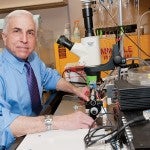All Research

November 16, 2012
Photo-switch for nerve cells in eye and brainUIC research could be a first step to overcoming degenerative eye diseases or to quieting epileptic seizures.

November 8, 2012
New, Improved Mouse Model of Human Alzheimer’s May Enable Drug DiscoveryResearchers have developed a transgenic mouse that carries a human gene known to increase risk of Alzheimer’s 15-fold. The new mouse, which mimics the genetics of the human disease more closely than any existing model, provides new evidence for the earliest cause of Alzheimer’s and may prove more useful in the development of drugs to prevent or treat the disease.

November 7, 2012
Kids consume more calories, soda when eating outChildren and adolescents consume more calories and soda on days they eat at fast-food or full-service restaurants, as compared to days they eat meals at — or from — home.
November 7, 2012
Latinos at risk for cardiovascular diseaseHispanics and Latinos living in the U.S. are highly likely to have several major cardiovascular disease risk factors, such as high cholesterol, high blood pressure, obesity, diabetes and smoking, according to a new, large-scale study.
November 5, 2012
Kids Consume More Soda and Calories When Eating OutChildren and adolescents consume more calories and soda and have poorer nutrient-intake on days they eat at either fast-food or full-service restaurants, according to a new study by researchers at the University of Illinois at Chicago.
November 5, 2012
U.S. Hispanics at High Risk for Cardiovascular DiseaseHispanics and Latinos living in the U.S. are highly likely to have several major cardiovascular disease risk factors, such as high cholesterol, high blood pressure, obesity, diabetes, and smoking, according to a new, large-scale study.

November 2, 2012
Study asks: do the arts make us better people?If you sing, dance, draw or act, you probably have an altruistic streak, according to a UIC study.
October 24, 2012
Antibiotics That Only Partly Block Protein Machinery Allow Germs To Poison ThemselvesPowerful antibiotics that scientists and physicians thought stop the growth of harmful bacteria by completely blocking their ability to make proteins actually allow the germs to continue producing certain proteins — which may help do them in.

October 24, 2012
Moving from foster care to independenceMaking the transition from foster care to adulthood can be overwhelming. A new program being studied at UIC in partnership with Children’s Home + Aid may help young adults facing this transition.

October 24, 2012
Researchers’ finding sheds light on how antibiotics workSome allow germs to continue to make certain proteins, which may do them in.